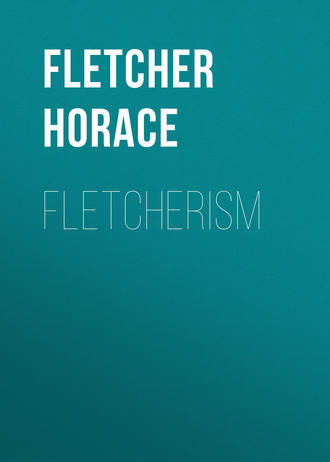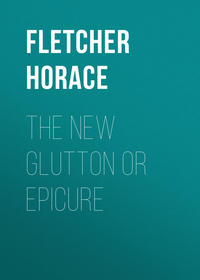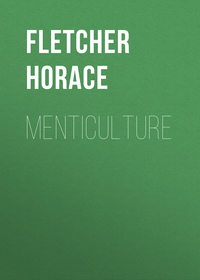 полная версия
полная версияFletcherism
This was his experience in 1902 or 1903, in connection with my being called to New Haven to submit to examination under the supervision of Professor Chittenden. It is Dr. Anderson to whom I refer, and he permits my stating his experience as often as I like for the good it will do. My expression of appreciation of his academic and athletic accomplishments is all my own and not authorized.
When I was turned over to Dr. Anderson for physical examination in the Yale gymnasium, my fitness was surprising to him as he has stated in his reports. He was also ripe for the reasonableness of my revelations. He seemed to me to be in the "pink of condition" himself, and he was so, as "pink" was judged at the time, for a man of his age.
Dr. Anderson tried more careful mastication than usual, and paid more attention to the thorough enjoyment of his food with the same pleasant results that come to everybody when making the trial, no matter how moderate and temperate they have been before. It is equivalent to putting a little keener edge on appetite than usual. Children and even fine ladies will perk up a little when they are conscious of being noticed, and the human senses are human in more ways than one.
Dr. Anderson was pleased with the revelation as a pleasure promoter, but did not notice that he was forgetting to take his daily prescription of stimulant. He was a medical man, past forty, beginning to slack up a little in his elasticity and strength. He was reaching that age when even the most temperate and careful begin to be a little lenient with themselves. His doctor friends were in the habit of prescribing a little stimulant to counter-balance this expected decline in energy and he took their advice. It was the medical fad of the period.
At first, Dr. Anderson ordered for himself one small drink of good medicinal whisky a day, and the effect was as expected. By and bye, however, a little more was needed, and this increasing demand continued its insistence until three drinks were no more efficacious than one had been at first. When I was introduced to him he had begun on his fourth drink daily, and yet burned it up in his exercise without feeling it much.
A couple of weeks after he began to check up my test by personal experience, which is the only scientific way, he all at once remembered, one day, that he had forgotten to take his whisky, and yet he was fitter than usual. I had not mentioned my own experience in this regard to him, I believe, as when we were together he kept me busy with the exercises of the 'Varsity crew, and I had little chance to give him accounts of my full experience. Besides, it did not occur to me that it would interest him who seemed to be moderation and temperance personified. And so he was, according to the scientific estimate of the time, but Nature has another standard of temperance, and under her strict guidance very little but good spring water is needed or desired.
HOW TO ENJOY WINETo illustrate this and also suggest a way of letting Mother Nature prove that I represent her correctly in this important matter, I will give an account of an actual happening.
I was lecturing in Buffalo, New York, in America, and was invited to address the members of the sumptuous Buffalo Club. I dwelt especially on Fletcherizing as a means of getting the good and the best out of food and drink, and yet for little cost, and at the close of the lecture a dozen or more of the audience asked me to demonstrate my point as above. I was happy to do this, and called for a pint of the choicest still wine, with cordial glasses. The request caused a smile among some of my hosts who were proud of being "one bottle" consumers.
When the wine came I poured out half a cordial glass as the portion I selected for myself and recommended the same prescription for the others, as a "starter." Then I breathed and sipped my delicious grape-juice, as I had learned to do from the professional wine-tasters on the Rhine, in Germany, and in the Burgundy region, in France. The others did the same, and seemed to get unusual satisfaction from both the bouquet and the taste.
What happens is this: You sense the wine by means of the olfactories as you would breathe in the odour of a delicately perfumed flower. Taste is excited and becomes jealous of Smell. You give Taste a taste. Something more subtle than taste; a sort of aroma, so to speak, spreads over the head. You feel the taste of the delicacy up around the temples, and the sensation is delightful in the extreme, fading slowly away but leaving a lovely memory impression.
Then you take another sip, and the sensation is about the same, and so on for a sip or two more, when the supremest delicacy of the wine ceases to express itself. Two or three sips more, and the wine no longer tastes good. Carried further, in this appetite-respecting manner, there will be a desire to spit out the sips, and there is no temptation to drink them.
Professional wine-tasters are supposed never to drink wine. After tasting it they spit out the remnant from which the taste has been exhausted. Tea tasters and beer tasters and special food tasters do the same in order to preserve their keen taste discrimination.
There is just as definite Swallowing Sense and Expectorating Sense as there is Taste Sense. There is just as strong Appetite Sense for proteid, when the body is short of it, as there is thirst-demand for water for the rehydration of the body. The Senses have sense!
Returning to the Buffalo Club experiment in demonstrating Epicurean Temperance: The half-bottle of wine gave more satisfaction to the dozen or more members of the Club who participated in the experiment than any of them knew was possible.
FLETCHERISM AS A CURE FOR MORBID CRAVINGSIt is not necessary to supply expensive wine for the complete satisfaction of the most delicate epicureanism if Fletcherizing is employed as an habitual cream-separating means. The cream of common wheat bread, and of anything that the normalized appetite favours, is as satisfying when the body is in need of what it contains as are drops of the most costly Johannisberger of the rarest vintages, and nothing but water thoroughly quenches real thirst.
The "testimonials" of one sort and another, including letters and verbal account, attesting to the effect of natural eating on abnormal desires or cravings, number thousands. The reform has not been the result of suggestion, although in some cases suggestion has assisted the cure of intemperate yearnings. Not alone has craving for alcoholic stimulant been abated, but in other ways morbidity has been corrected, and I as well as some medical men I know, have received grateful acknowledgment of the happiness secured by the natural sloughing off of weaknesses or passions which had been a source of self-hatred. Think what immunity from such baneful possibilities means to youth of both sexes!
A TRIAL OF FLETCHERISM AND ITS RESULTSThe very large test of Fletcherism as a temperance expedient hereinbefore referred to was entirely accidental. It occurred in a community of students of a missionary college in Tennessee.
The institution is conducted under religious auspices, the sect supporting it being that called "Seventh-Day Adventists." The buildings are on a large farm, and most of the students earn their board and tuition by doing farm work. Many subsist by what is called "boarding themselves," that is: purchasing raw food and doing their own cooking. To assist in this independence there is a commissary where everything needed is bartered or sold.
One of the prominent persons in the Adventist denomination is Dr. Kellog, Superintendent of the Battle Creek Sanatorium, who from the beginning has been one of the most ardent advocates and teachers of Fletcherism, and to whom is largely due the permanency of its designation as "Fletcherism."
During a visit to the Tennessee institution, Dr. Kellog so successfully preached the merits of natural eating, that all the students were induced to give it a trial as a health and economic measure.
The trial was conducted under observation for six months, when an accounting was made. During the six months the drafts on the commissary had been a trifle less than half what they formerly had been, and at the same time the community had been free from the usual "seasonable" and bilious complaints or illnesses. No one had been cured of a craving for alcohol, for the reason that all were teetotalers on principle, but the sheer economy and healthfulness of the results obtained were of prodigious importance to young persons "working their way through college." The amount of the benefit can be imagined when it is considered that they needed to work less on the farm to earn their food because the food-bill was much reduced. The time saved from work was available for study, and the increase of energy and immunity from sickness added enormously to the average student ability.
One day there was brought to the institution on a stretcher a poor chap of the neighbourhood, crazy with delirium tremens. In the infirmary of the college emergency patients were received, as part of the missionary training is medical.
The sorry dipsomaniac was sobered-up in the usual way and instructed in the process of Fletcherizing. He took kindly to it, as all do who have been dietetic sinners, and the result was the same as with the beery and bleery tramp mentioned in the early part of this chapter. He lost his "taste" for "booze" and continued the incident by becoming a worker on the place and a sound temperance example.
Here is a revelation worth while to the missionary workers. Their field of service was the mountain districts of their State and the neighbouring State of North Carolina, which are famous for their moonshine whisky stills. The whisky distilled in the mountains does not pay any Internal Revenue tax if it can be avoided, and hence the stills are hidden in deep forests and operated by the light of the moon. The inhabitants of these lawless regions are the poorest of the poor and call down the contempt of the negroes. They are called "poor white trash," and moonshine whisky that will kill at fifty yards is responsible for much of the poverty and trashiness. They are as good marks for missionary sympathy as any "heathen" the world can produce anywhere. I have been among them all and I assure you, these listless and luckless inebriates of the poor white trash regions are the most pitiable.
FLETCHERISM AS FIRST AIDAs soon as the incident of the victim of delirium tremens had been measured at its full significance, it dawned upon the missionaries that Fletcherism was to be their most potent assistant in curing the mountaineers of their vices and preparing them for religious instruction. They were won over to the ideal of Dietetic Corpoculture as "First Aid to the Injured" in establishing Temperance on a sound basis.
Thus it was that the graduated missionaries introduced themselves to their charges by building simple ovens of road-side stones in rail-fence corners, as field surveyors might do, and invited those who came along to feed with them.
There is never any trouble in securing guests at a feed anywhere, and it is extremely easy among the poor to whom free food means less work and more leisure. It is easy, too, to get the ears and attention of guests at meals who would like to be invited again. It is also easy to teach Fletcherizing to youthful dinner-guests, as Madame La Marquise de Chamberay and I found out in connection with our East Side investigation in New York.15
The result of this strategy on the part of the Tennessee missionaries was reported to a meeting at the Battle Creek Sanatorium, and the summary of the good attained up to that time was as follows: More than a thousand persons were saving an average of $3.00 a month on the cost of their sustenance, and were temperance converts through the sloughing off of all desire for their moonshine product. Think of a saving from sheer waste of $3,000 a month ($36,000 a year) to a community where $1,000 is considered to be a princely fortune, and a saving of a thousand human units from the scrap-heap of worse than death!
CHAPTER XIII
THE MENACE OF MODERN MIXED MENUSGluttony and Avoirdupois – Contentment – Fletcherism and Political EconomyWhile it is true that "Variety is the spice of life," and that an appetising variety of plain food is more tempting than a monotony of the most highly-spiced dishes, every tendency of modern menus is a menace to health, and the only way to counteract the menace is to be especially careful in observing the rules of Epicurean Economy.
If the soup is particularly good, there is a temptation to go on and completely satisfy the appetite on it. It requires the restraint of civilized suppression to keep from following the example of Oliver Twist, calling for more and more till the supply or appetite is exhausted.
Then comes the fish: Who can resist accepting a generous helping of this course, served in any one of the dozens of styles that are familiar to the patrons of French restaurants? And how hard it is to refrain from cleaning up the plate in a hurry so that none of it will be whisked away by the waiter to make room for course number three.
Nothing has been said of the Hors d'œuvres of the French menu, or the Ris Tavel of the Dutch East Indian gorge, or the Smoer Gose of a Scandinavian "Spread." A fairly ravenous person, given time enough, and with no one looking, can be counted on to make a "square meal" on these "appetizers" alone before the soup is announced.
Mention of the "Roast," the "Entrées," the "Légumes," the "Dessert," and a bewildering variety of cheeses to be followed by fruit, nuts and raisins, with several different wines, cordials, coffee, and cigars or cigarettes on the side. Even mention of them is likely to cause psychic indigestion.
If one goes to a restaurant with a quarto, gilt-top appetite, and scans one of the monster, modern, mixed menus for a suggestion of what he shall order, he will, undoubtedly, see five or six items that will appeal to his imagination as "just the thing"; and if the cost is no special reason for restraint, he will put down on his order list twice or three times as much as he can possibly eat in order to be as many kinds of a fam dool as he can be at the moment.
This is not an unreasonable or fantastic illustration of the menace of a multiple menu and a colossal appetite in convenient conjunction. It is said that an amorous lover has neither conscience nor discretion. This may sometimes be the case; but it is always a sure betting proposition that an opulent, ravenously-hungry person will measure off with his eager eyes much more than his tummy can possibly hold.
Then follows the inclination of the average human being to "get his money's worth," even if he "must die for it." This is not alone a human characteristic exaggerated in sumptuously-civilized communities, but it is an animal trait as well. If a racehorse is turned out in a field of clover that stands as high as his neck, he will very likely eat himself to death. Likewise, if a little child, with the animal characteristics uppermost, is given a bag of sweets, he will be sure to want to put himself securely outside of the whole bag-full in the shortest time possible, so that he will make certain that no one will take it away from him.
GLUTTONY AND AVOIRDUPOISThe menace of the munificent menu also leads to the uncomfortable acquisition of surplus avoirdupois. On some persons it has quite the opposite effect, however. The writer remembers that it was a tradition in his college that the thinnest man of a class was always the biggest glutton. Each year, a prize of a combination knife, fork, and spoon, was given to the grossest eater of the junior class. Within my memory the recipient was always a very thin and cadaverous fellow.
As a matter of fact, the hardest work done by the body is performed within the body. It is the work of digestion, general metabolism, and the constant and never-ceasing pumping of the blood through hundreds of miles of veins and arteries. If this work is measured in terms of heat units thrown off (calories) the internal activity of the body is as two to three parts of the whole heat energy released into the surrounding air.
It is quite possible to increase this heat expense by 20 to 50 per cent. by merely overloading the stomach a little, and crowding the mechanism of metabolism to its utmost. Sometimes the crowding is carried so far that the organism cannot stand it; sometimes bursts; and, there you are – dead.
CONTENTMENTThe supremest felicity is not wanting anything. If one cannot think of a single thing in the wide, wide world, not even oblivion, that they would have in addition to what they are enjoying at the moment, their cup of contentment is full.
In regard to eating, to have Fletcherized a few morsels of the finest food that anyone's mother ever made, until there is no desire for more, and yet the contentment is of that calm sort that indicates that there is no overloading of the stomach, is gastronomic Heaven, and it carries with it a blanket of general contentment that covers the universe.
On the other hand, to have eaten unwisely, as the result of animal voracity, over-estimate of capacity, and greed of getting outside of all that must be paid for, or, in slavish deference to aggressive hospitality, is Hell from the finish of the meal until the finish of the "spell of sickness" that may follow the gorge. It were almost possible to sink into the depths of such gluttony on any one, two or three of the best dishes possible to imagine; only a modern multiple mixed menu is liable to bring this degradation, and hence the menace of it.
Suppose, again, you are framing up a business deal, and have a customer "on the string." The best way to get at his heart and pocket-book is through the sociability accompanying a sumptuous meal.
You seek a Princess' Restaurant, a Ritz-Carlton or a Waldorf, and make a spread of your Epicurean generosity, your bank account, and your business web or net. If you insist on filling your guests full of everything, you must set the example. Results: Similar in all cases.
Science is not even secure against the temptation of the monumental menu. The writer has known the citadel of scientific conservatism to be captured by five-dollar still-wine and fifty-cent cigars, as accompaniments of six-course dinner-dreams. This, too, in the interest of an Epicurean Economy that put all of the academic teachings in the back-number list, and favored fifty-cent banquets with nary a cigar to top off the feast.
FLETCHERISM AND POLITICAL ECONOMYIt may be argued that the waste attendant on sumptuous living is the most prolific means of keeping money in circulation: of putting bread into the mouth of the servant class: and that Spartan simplicity would throw the world back two thousand years in the civilized progress it has made.
That might be true of some forms of sumptuousness, but not as to the wanton waste of food through the temptations of magnificent menus. Food is the realest of all forms of wealth. Scarce ever a grain of wheat or kernel of corn is wasted. The story of the Englishman who visited Kansas, and from there took home to London a colossal joke at the expense of corn and Kansas, illustrates the permanence and indestructibility of food wealth.
Riding through the State, with a native Kansan, an English globe-trotter wondered at the endless fields of yellow "maize." He called it maize, but the Kansan called it "corn."
"What in the world do you do with all this maize?" said the mobilized Cockney. "Oh, that is easy," replied the native: "We eat what we can and we can what we can't."
In due season this strange answer was interpreted to the visitor and he determined to can the joke for serving up at his club in London.
Arriving in England, the joker made deliberate preparations to open his can of Kansas corn to the best effect. He invited a set of chappies to dine with him and the pièce de résistance was Kansas canned corn.
Having engineered the matter to the right point of curiosity, the host told the story of his visit to Kansas and finally exploded his finale in this wise: "Do you know, these Americans out in the West are a jolly lot. They have a dry sort of wit, too. I was travelling in company with one of them through the State of Kansas, which is the great maize State of the country. They don't call it maize, however, they call it corn, and what we call corn they call wheat. Well, I was amazed at the miles and miles of maize – no pun intended and no apology needed – and asked my companion whatever in the world they did with it all. And what do you think he said: He said, 'We eat what we can and the rest we put up in tins!'"
It took the perpetrator of the joke another week to find out why no one laughed, and spoiled everything by still waiting for the point after the real explosion took place: and no international incident is recorded in the history of that day.
Yes, the really most vital wealth is stored in the food treasuries. Profusion of it carries down the prices and this raises wages by comparison. There is always a spot-cash market for food at some price, which is not the case with many other forms of property.
But the waste of the food material itself is insignificant compared to the waste of energy that must take place to get rid of it, the moment it is swallowed and beyond personal responsibility. The transportation of a carload of wheat by rail from Saskatchewan to the Atlantic seaboard by rail and across the ocean by steamer is small as compared with the expense of getting a mouthful of bolted bread through an alimentary canal that is congested with indigestion.
CHAPTER XIV
THE CRUX OF FLETCHERISMThe Value of Occasional Fasting – The Power of Freedom from Indigestion – Muscles have Memories
Almost everybody eats with sufficient care most of the time; otherwise, all would be on the sick-list all the time and the death-rate would be increased enormously.
Whatever sickness, depression, weakness and other illnesses there are now are the result of occasional carelessness only.
The remedy for lapses from carefulness is knowledge of what the natural requirements are, and training the muscles and functions employed in nutrition to work always with careful deliberation and never allow themselves to be hurried with their work.
It should also be made a habit
NOT TO EAT ANYTHINGwithout a keen appetite. This involves knowing how to recognise a true appetite and also how to detect a false craving. Waiting for a healthful call for food, for any length of time, can do no harm, and should not cause any discomfort or inconvenience; but exciting a false desire and taking food before the body is "good and ready" for it, starts trouble brewing at once.
If the worst results of premature or hurried eating were immediately felt, no one would get in the habit of sinning in this manner. Like auto-intoxication from excess of alcohol, poisoning from unnecessary or unwelcome food – either an excess of it or when taken untimely – is an aftermath of unhealthy stimulation or exhilaration.
The crux, then, of dietetic righteousness, or, Fletcherism, is habituating the body to practise that Eternal Vigilance, which is
THE PRICE OF FREEDOM FROM INDIGESTIONIt should be much easier to instal a habit of carefulness than it is to permit habits of carelessness. It is possible so to sensitize the muscles which control swallowing that they will refuse to act and will cause choking if an attempt to swallow prematurely is made. Systematic attention to this detail of care for a week will secure it as a permanent habit without need of any further attention to it.
The statement that it is easier to do the right thing than it is to do the wrong thing: and that it is easier to fix firmly good habits than it is to acquire bad habits, will probably be questioned or disputed by many; but practice of the principles which underlie Fletcherism will cure such pessimism relative to the attitude of Mother Nature towards her most perfect product in general, Man.
Man is given more liberty and more license than any other natural expression and, with the endowment which we call "intelligence," he is raised to a position of partnership in assisting natural evolution and progress.
From inklings of experience it is reasonably inferred that Man is more susceptible to evolutionary influence than any of the animal kind; that he can ever progressively train himself towards higher and higher supermanhood; that he is able to perform marvels in taming and training other animals and in perfecting plant life to prodigious proportions. He is even "gifted" to the extent of overcoming, harnessing, and using at will the "forces of Nature," and dispelling the mysteries. He can only do this, however, by co-operating with Nature in the most intelligent and faithful manner.







